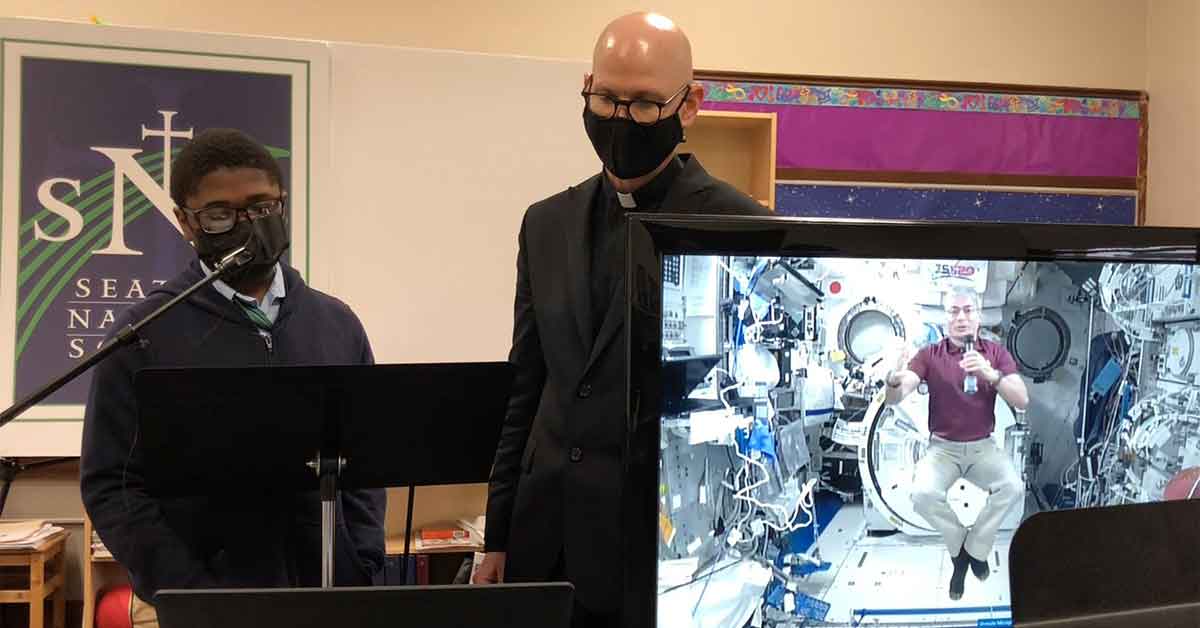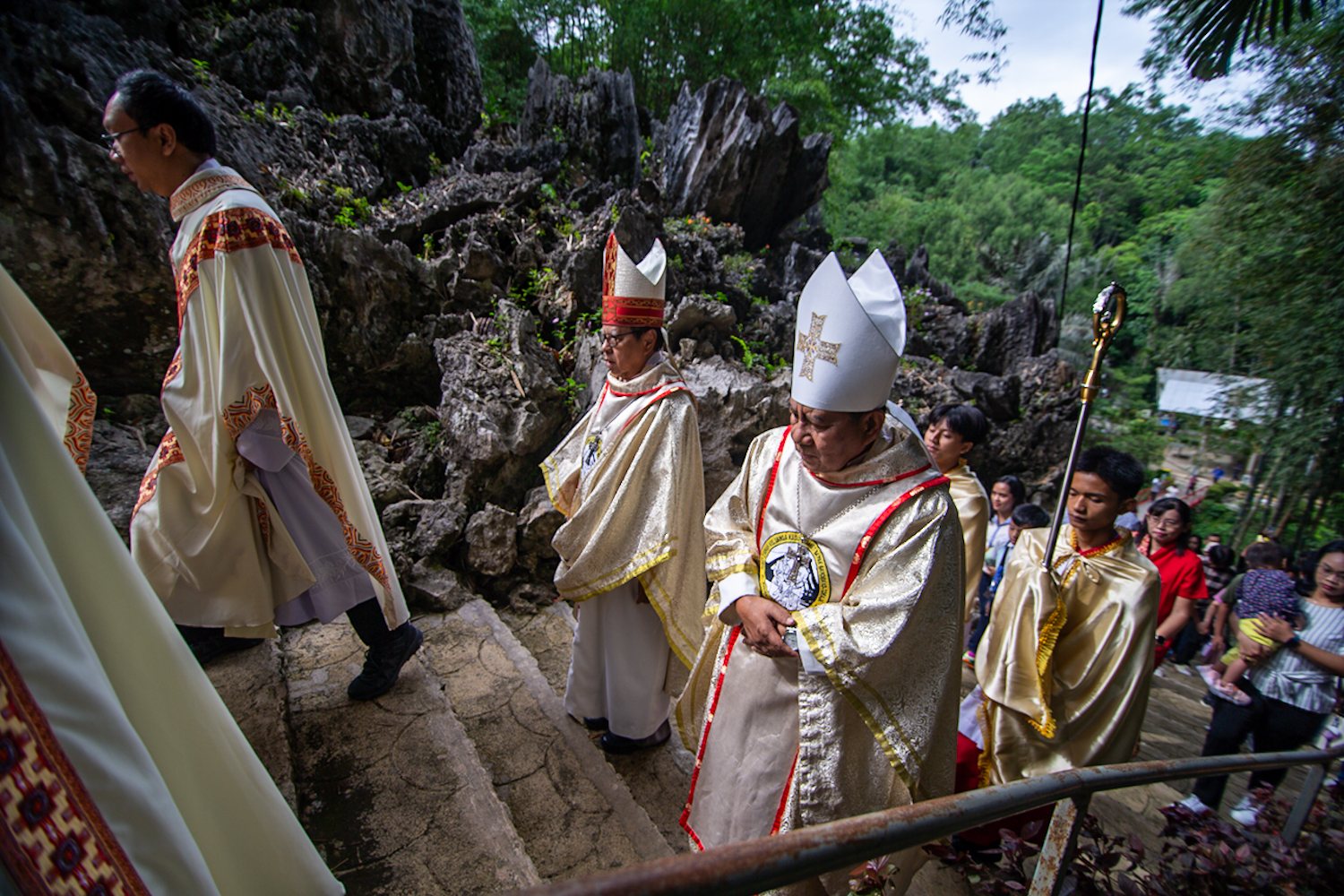Robaird O’Cearbhaill
Hong Kong Correspondent
The Seattle Jesuit school for poorest kids was not just a dream come true but that dream reached as far as outer space recently.
Seattle Nativity School gives free tuition aimed at those with the lowest family incomes. All students are of black or Hispanic origin.
In a Q&A, an astronaut openly answered the students, live streaming from the International Space Station (ISS). Before we get to the answers, there’s the mystery of how this unlikely event happened.
How was Seattle Nativity School able to pull this off? By good fortune, through a close personal NASA connection and their Catholic charity towards the most vulnerable.
The headmaster, Fr Jeffrey McDougall SJ, was a classmate of spaceman Mark T Vande Hei. Having “played football with Vande Hei, a classmate at Benilde-St. Margaret’s High School in Minnesota and he would often brag to his students that he knew an astronaut — one on the International Space Station, no less,” reported Jeffrey Barker who had a scoop on the worldwide story for the Catholic Northwest news outlet of the Archdiocese of Seattle.
He added, “Word that Father McDougall was telling his students about Vande Hei spread and the priest said he started getting emails from NASA. The way the priest tells it, Vande Hei said, ‘If he’s talking about me, I should talk to them myself.’ And he did, but if, and how efforts on his behalf were as instrumental as his inside job, getting NASA to set up the event is not revealed so far. Thus the event via live NASA-managed video and audio link, went ahead while Vande Hei was passing over Seattle at 17,000 mph (27,358 kph).
“Here we go,” one student exclaimed, as Vande Hei appeared on the school screen. Hei, “a flight engineer, casually floated into view wearing khaki cargo pants and a burgundy polo shirt. He read from a tablet computer, which he then attached to his pant leg.”
“He performed a couple of zero-gravity backflips while waiting for the audio to connect,” Barker recorded.
The students lined up in front of Fr MacDougall, microphone in hand, to question the astronaut, via audio. While the children could see Vande Hei, he could not see them, only heard them.
The first students’ question, in Barker’s article, was unusually challenging: “How has being in space affected your view of God?” ventured an eighth grader.
Unsurprisingly, Vande Hei paused before answering.
“It has made me feel like God’s really complicated. Human beings have worked really hard to understand God and our relationship with God. I think I’m much more accepting of the wide variety of ways human beings experience God.”
Overall, Barker said the questions mostly covered predictable ground: How do you sleep? Without gravity, how do you exercise? What do you miss most about Earth? Yet “Vande Hei fielded the questions like a seasoned politician, answering directly, cracking Dad jokes, performing zero-gravity maneuvers, yes, to demonstrate Newton’s laws of motion, but also to entertain.”
The report added that Vande Hei “mentioned some of the work the space crew is doing, like trying to grow chilies in space, using a syringe to water them; recycling 95% percent of all water used; and conducting an experiment to help people better understand how to prevent Alzheimer’s.” Moreover, he made clear that he has an aim, and spoke about his ISS international colleagues.
Vande Hei talked “about international camaraderie on the space station, noting that the current crew consists of two Japanese astronauts, three Russians, one German and three Americans. They share a weekly meal, often with foods from one of the astronaut’s cultures, and they’ll stay up late to watch a movie together. “I’m up here with some people that are wonderful to go camping with and we’re all in this big camper cruising around the world at five miles a second.”
Vande Hei also balanced the pros and cons of being in space away from the normal life on Earth. Barker wrote, “He does miss being outside, feeling the wind and the rain, being able to see trees very easily, not 250 miles away.” But the writer added, “Vande Hei has seen some amazing sights from space — the most beautiful being auroras in both hemispheres.”
“They are these ghostly green curtains that make you feel very tiny, like there’s processes you’re getting to witness that look like they’re constantly changing, but they’ve been going on for well before humans ever lived on the earth,” he explained.
Vande Hei also spoke to the students “about the importance of teamwork and education,” Barker wrote. “My Catholic education … really taught me the importance of putting other people first, and that helps you be a good team player. The things you’re learning about in your school are really, really essential,” he said, “not just to become an astronaut, but just being a happy, successful and productive human being,” as the ISS team shows.
Barker said that at the end of Vande Hei’s current ISS mission he will “hold the longest single space flight – 353 days – for an American, and internationally among the top list for one mission duration.”
Vande Hei, aged 55, is a retired US army officer who joined the 2009 NASA fourteen-member astronaut group.
(Photo: Mark Vande Hei, a NASA International Space Station astronaut, takes live questions from students at Seattle Nativity School in Washington state. Also pictured is Jesuit Father Jeffrey McDougall, the school’s president. CNS photo/courtesy Seattle Nativity School via Northwest Catholic)


 Follow
Follow


